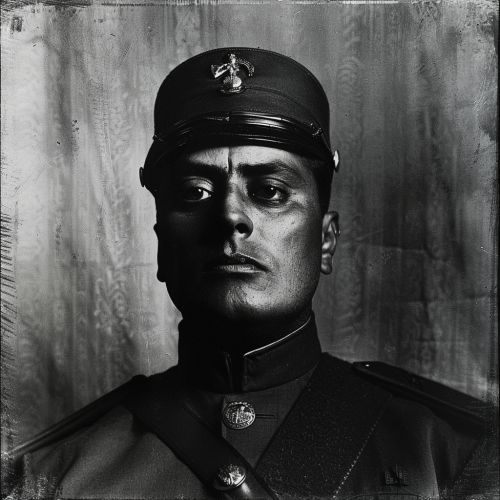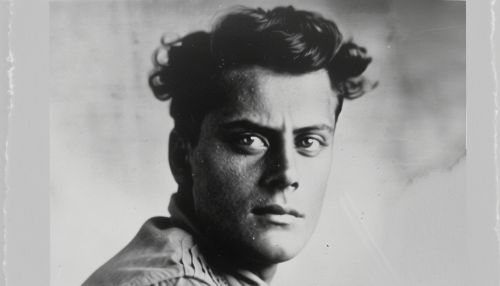Benito Mussolini
Early Life and Education
Benito Amilcare Andrea Mussolini was born on 29 July 1883, in Predappio, a small town in the province of Forlì in Romagna. His parents were Alessandro Mussolini, a blacksmith and a fervent socialist, and Rosa Maltoni, a devout Catholic schoolteacher. Mussolini was named Benito after Mexican reformist President Benito Juarez, reflecting his father's socialist political convictions.
Mussolini's early education was obtained in the local school run by Salesian monks. Later, he was sent to a boarding school in Faenza, where he proved to be a disruptive influence. He was expelled and sent to another school, this time in Forlì, where he obtained a teaching diploma in 1901.


Early Political Career
Mussolini started his political career as a socialist, working for the socialist newspaper "La Lotta di Classe" (The Class Struggle). He moved to Switzerland in 1902 to avoid military service, where he became involved in the local socialist party. He was eventually expelled from Switzerland for his political activities and returned to Italy in 1904.
In 1912, Mussolini was appointed editor of the socialist newspaper "Avanti!" (Forward!). Under his leadership, the paper's circulation significantly increased. However, Mussolini's support for Italy's entry into World War I in 1914 put him at odds with the socialist party, leading to his expulsion.
Formation of the Fascist Party
In 1919, Mussolini formed the Fasci Italiani di Combattimento (Italian Combat Squad), which later became the National Fascist Party. The party attracted disillusioned war veterans, nationalists, and those dissatisfied with the existing political system. The Blackshirts, paramilitary squads under Mussolini's command, used violence and intimidation against the party's political opponents.
In 1922, Mussolini and his March on Rome pressured King Victor Emmanuel III to appoint him Prime Minister. Mussolini gradually dismantled the democratic institutions and established a one-party rule.
Dictatorship
Mussolini's rule, known as the Fascist regime, was characterized by totalitarian control, aggressive nationalism, and a cult of personality. He implemented policies of public works, land reclamation, and aggressive foreign policy. His economic policies, known as corporatism, aimed to create a self-sufficient national economy.
Mussolini's regime was also marked by severe political repression. Opposition parties were banned, press freedom was curtailed, and a secret police force was established. His government propagated fascist ideology through education, propaganda, and youth organizations.
World War II and Downfall
Mussolini aligned Italy with Nazi Germany and Japan within the Axis Powers in World War II. His military campaigns in North Africa and the Balkans were initially successful but eventually ended in failure. The Allied invasion of Sicily in 1943 led to his downfall.
In July 1943, Mussolini was arrested and the Fascist Party was dissolved. He was rescued by German forces and established the Italian Social Republic in Northern Italy. However, the republic was short-lived. As the Allies advanced into Northern Italy in 1945, Mussolini was captured and executed by Italian partisans.
Legacy
Mussolini's legacy is complex and controversial. His fascist regime left a lasting impact on Italy and the world. While his aggressive foreign policy and totalitarian rule resulted in widespread destruction and loss of life, his public works programs and efforts to modernize Italy's infrastructure are often highlighted. Mussolini's ideology and methods have been studied, criticized, and emulated by various political movements worldwide.
